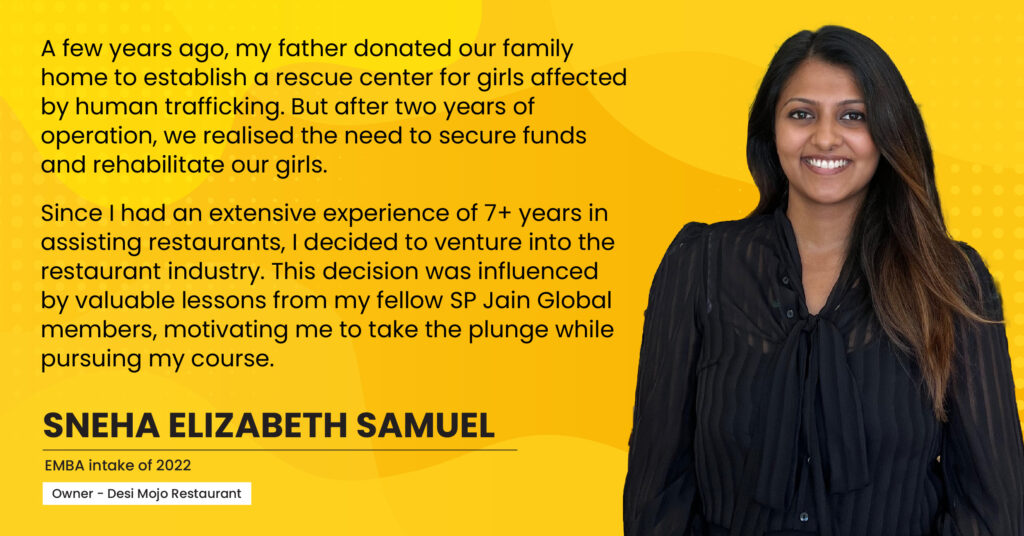From Zomato to Becoming a Successful Entrepreneur – Sneha Elizabeth Samuel’s EMBA Story
Coming from a middle-class family in Dubai, Sneha Elizabeth Samuel took on the responsibility of supporting her family on her shoulders at the age of 17 before her hard work and dedication landed her with Zomato. Finishing her bachelor’s degree alongside work, Sneha discovered her strong entrepreneurial drive and refused to look back since then. She enrolled in SP Jain’s Executive MBA program and set the stage for a transformative journey motivated by her aspirations.
How did the knowledge and skills Sneha gained through the EMBA course enable her to pursue her dreams? Join us to know more about her journey from being an ex-Zomato employee to a successful entrepreneur.

1. Would you like to tell us about your personal and professional life?
Born and brought up in Dubai in a middle-class family, Sneha Elizabeth Samuel has two sisters; my father had a small business, and my mother is a pharmacist. I had the advantage of starting my professional career at a young age due to my family circumstances. With my father’s business facing difficulties and the responsibility of supporting my parents and two sisters, I began working at the age of 17 to fund my education.
Starting with roles such as receptionist and document controller, I gained valuable experience and personal growth through various operational jobs. Eventually, in 2015, I joined Zomato, where I was perhaps the only person without a bachelor’s degree.
Since I realised the importance of education, I did my bachelor’s degree while working simultaneously. I am immensely grateful for the support from my colleagues at Zomato during that time. It was during my tenure at Zomato that I realised my strong desire to become an entrepreneur.
Motivated by this aspiration, I enrolled in an entrepreneurship course at SP Jain. During this transformative journey, I took the leap into entrepreneurship by opening my own restaurant. This experience marked the beginning of my entrepreneurial adventure, and I am grateful for the knowledge and skills I gained through the course that enabled me to pursue my dreams.
2. What motivated you to transition from a corporate job to becoming a restaurant owner while pursuing your EMBA?
My father helped establish a rescue centre by donating a house he built for us to aid girls affected by human trafficking. However, after two years of operation, we faced the dual challenge of securing funds for the centre’s sustenance and rehabilitating our girls. To address these challenges, I realised we needed to establish a business that could generate cash flow and provide employment for our girls, offering them a livelihood. Considering my extensive experience in assisting restaurants over the past seven years, I decided to venture into the restaurant industry. This decision was influenced by the valuable lessons and experiences shared by fellow members of SP Jain, which motivated me to take the plunge while pursuing my course.
3. How did your EMBA experience contribute to your decision to venture into the restaurant industry?
My EMBA experience greatly influenced my decision to pursue entrepreneurship in the restaurant industry. The program provided comprehensive knowledge across various business areas, including strategy, finance, marketing, and operations, thanks to our experienced professors. These learnings formed a strong foundation for understanding the inner workings of successful businesses. During the EMBA, I gained practical experience by working on real-world business cases, projects and HBR simulations, allowing me to apply the theoretical concepts learned in the classroom.
This hands-on approach honed my problem-solving and critical thinking skills, providing me with a deep understanding of the complexities involved in running a business. Additionally, the collaborative learning environment facilitated engaging discussions and interactions with professionals from diverse industries, including the restaurant sector, enhancing my understanding of different business sectors and their unique challenges.
4. Could you tell us about the network you built in the EMBA classroom and if you leveraged that for your entrepreneurship journey?
Through my EMBA experience, I had the privilege of establishing a robust network comprising professionals from diverse industries and backgrounds. The collaborative classroom environment fostered teamwork, collaboration, and peer learning, enabling the formation of lasting connections and relationships. As I embarked on my entrepreneurial ventures, this network became a valuable resource for guidance and support. Many of my classmates held leadership positions, offering me a trusted sounding board for advice, sharing their experiences, and providing practical insights into effective business management. Seeking their feedback on business plans, marketing strategies, and operational challenges proved instrumental in refining my ideas and making well-informed decisions.
5. What were the biggest challenges you faced when starting your own restaurant?
When starting my restaurant, I encountered several significant challenges. One of the foremost hurdles was establishing a strong customer base and building brand awareness in a competitive market. It required strategic marketing efforts, including an effective online presence, targeted advertising campaigns, and word-of-mouth promotion.
Attracting and retaining customers proved to be a challenge requiring continuous efforts to deliver exceptional dining experiences and maintain customer satisfaction. Another major challenge was managing the operational aspects of the restaurant. It encompassed various elements such as menu planning, sourcing quality ingredients, maintaining inventory, hiring and training staff, ensuring smooth kitchen operations, and providing excellent customer service. Balancing these operational tasks while adhering to cost-effective practices and maintaining profitability was a delicate juggling act. Additionally, dealing with unexpected issues such as equipment malfunctions or staffing emergencies required quick thinking and effective problem-solving skills to minimise disruptions to the business.
6. How did you leverage the skills and knowledge gained during your EMBA to navigate these challenges?
During my EMBA journey, I gained a diverse skill set and valuable knowledge that proved essential in overcoming challenges while starting my restaurant. The program sharpened my strategic thinking abilities, allowing me to analyse market trends, identify target customers, and create a unique brand identity. This expertise helped me stand out in a competitive culinary landscape and attract a loyal customer base.
Additionally, the leadership development aspect of the EMBA program played a crucial role. I learned effective team management, conflict resolution, and motivation techniques, which enabled me to build a cohesive and high-performing team in the kitchen. This harmonious environment contributed to delivering exceptional dining experiences to our patrons. Moreover, the strong network of professionals I built through the EMBA program became an invaluable resource. I leveraged these connections for advice on operational challenges, supplier sourcing, and exploring potential partnerships. Their expertise and support served as a secret ingredient stash, helping me find innovative solutions to various problems.
7. Do you have any advice for working professionals in F&B Industry who are a similar career shift into entrepreneurship and wish to pursue an EMBA program? How can they make the most of their SPJ journey? Aspiring F&B professionals looking to shift into entrepreneurship and pursue an EMBA program like SP Jain can benefit from the following advice. Firstly, approach the program with an entrepreneurial mindset, embracing the opportunity to learn and apply diverse business concepts. Challenge conventions, think creatively, and bring your unique F&B expertise to the table. Secondly, networking is crucial during an EMBA program. Connect with classmates, alumni, faculty, and industry professionals to build a valuable support system and find potential collaborators. Seek projects and internships aligned with your entrepreneurial aspirations to gain practical insights into the F&B industry. Embrace collaboration and teamwork, engaging with classmates from diverse backgrounds. Tap into their expertise, form study groups, and problem-solve together. Seek guidance from experienced faculty members and connect with successful F&B industry alumni who have transitioned into entrepreneurship. By combining your F&B expertise with the business acumen gained through an EMBA, you’ll be well-prepared to embark on an exciting entrepreneurial adventure in the food industry.
Related Posts
-
 In This World of Internationalisation, Will You Survive?
No Comments | Jul 27, 2011
In This World of Internationalisation, Will You Survive?
No Comments | Jul 27, 2011 -
 Key to great interviewing
No Comments | Aug 19, 2011
Key to great interviewing
No Comments | Aug 19, 2011 -
 The Perks of Having a Global Network
No Comments | Oct 30, 2014
The Perks of Having a Global Network
No Comments | Oct 30, 2014 -
 SP Jain President among top Indian business leaders to accompany Indian PM to Australia
No Comments | Nov 26, 2014
SP Jain President among top Indian business leaders to accompany Indian PM to Australia
No Comments | Nov 26, 2014
